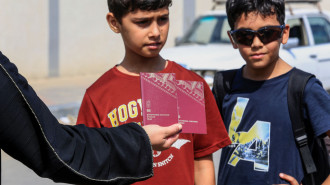Iraq expands aid relief for displaced Lebanese as Israel widens attacks
As Israeli airstrikes intensify in Lebanon, Iraq ramped up its humanitarian efforts to support displaced Lebanese families. The expanding violence by Israel has led to a surge in displaced civilians, prompting both the Iraqi government and religious authorities to mobilise extensive aid efforts.
In response to Israel's invasion of Lebanon, which has resulted so far in over 2,000 deaths, injured thousands, and displaced tens of other thousands, Iraq has taken steps to provide refuge for those fleeing the conflict.
One of the most significant contributors to the relief campaign is the Holy Al-Abbas Shrine, which has announced the establishment of a dedicated support centre in Damascus, Syria. This centre aims to assist displaced Lebanese families by providing essential medical, food, and logistical support.
Ahmad Hassan Al-Fahad, Assistant Head of the Public Relations Department at the shrine, confirmed that the initiative is operating under the guidance of Iraq's top Shia cleric, Grand Ayatollah Ali al-Sistani. The goal is to offer refuge to those fleeing the conflict, with plans to transport many to Karbala, Iraq, where they will be provided with free accommodation.
The Al-Abbas Shrine's relief campaign extends beyond the Syrian-Lebanese border. On Monday, the shrine dispatched its third convoy from Karbala, delivering approximately 1,200 tons of supplies, including food, medical equipment, water, and fuel to the conflict-stricken regions of Lebanon and Syria. The convoy, consisting of 55 trucks, follows earlier aid missions that have provided critical assistance to thousands of displaced people.
In addition to the aid convoys, Iraq has also deployed mobile clinics to provide immediate medical care to those injured in the conflict. Those requiring more advanced medical treatment are being transported to Al-Kafeel Specialist Hospital in Karbala. To manage the growing influx of injured civilians, a field hospital has also been set up in Syria. These efforts are being coordinated with the Iraqi government, local Lebanese and Syrian authorities, as well as charities on the ground.
The Iraqi government has also taken steps to accommodate the influx of displaced Lebanese into Iraq. Prime Minister Mohammed Shia' Al-Sudani recently announced a series of measures to ease the burden on Lebanese nationals. These include the provision of free entry visas and a 30-day renewable visa extension for Lebanese residents in Iraq. For critically injured Lebanese citizens, the Iraqi government is facilitating medical transfers to Karbala for urgent treatment, as hospitals in Lebanon struggle to cope with the overwhelming number of casualties.
Iraq's Ministry of Migration and Displacement has also been actively involved in supporting displaced Lebanese families. In cooperation with other governmental agencies, the ministry has formed committees to streamline entry procedures at border crossings and ensure that services are delivered efficiently. Deputy Minister of Migration, Karim Al-Nouri, emphasised the moral imperative of providing aid, stating that the ministry is committed to coordinating its efforts with the Iraqi Red Crescent and other organizations to deliver the necessary relief.
As of one year of Israel's war, Israeli airstrikes have killed more than 42,000 Palestinians in Gaza and the occupied West Bank (with some estimates putting the death toll much higher).
As the conflict continues to expand, Iraq remains steadfast in its commitment to offering aid to displaced Lebanese families.



 Follow the Middle East's top stories in English at The New Arab on Google News
Follow the Middle East's top stories in English at The New Arab on Google News


![The US vetoed a UN Security Council (UNSC) resolution demanding a ceasefire in Gaza [Getty]](/sites/default/files/styles/image_330x185/public/2185152251.jpeg?h=7ef8ac04&itok=RpLSj2pu)